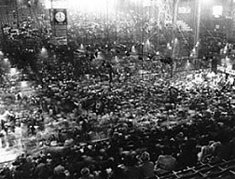🎉 The Moondog Coronation Ball: Rock and Roll’s Very First Night

It’s always tough to pinpoint the exact birth of a cultural movement—but for rock and roll, we’ve got a pretty good guess:
March 21, 1952.
That’s the night of the Moondog Coronation Ball in Cleveland, Ohio—a wild, overcrowded, one-song concert that’s widely regarded as the first rock and roll show ever held.
Sure, the music itself wasn’t brand new. It had been thriving in Black communities for years under the name rhythm and blues. But what was new was the name, the packaging, and the man helping bring it to the mainstream: Alan Freed.
🎙️ Alan Freed: The DJ Who Named the Sound
Alan Freed was a radio DJ who had recently started calling this electrifying blend of blues, boogie, and backbeat “rock and roll” on his show, Moondog’s Rock ’n’ Roll Party. The name stuck. So did his on-air persona, “Moondog.”
Local promoter Lew Pratt knew Freed had a growing teenage fanbase, so he tapped him to help publicize a live concert featuring some of the top rhythm and blues performers of the day. The event? The Moondog Coronation Ball.
The “coronation” turned out to be for Freed himself—because that chaotic, unforgettable night cemented his reputation as the genre’s unofficial “King of Rock and Roll.”
🎫 Sold Out… and Then Some
Freed’s radio station and sponsors helped promote the show, and 7,000 tickets for the Cleveland Arena went fast. The top price? A mere $1.75. That’s cheaper than your favorite coffee today.
When that batch sold out, another 2,000 tickets were printed—and those vanished just as quickly. Then came the kicker: counterfeit tickets started showing up. Nobody knows how many were in circulation, but the crowd that showed up that night far exceeded capacity.
🧍♂️🧍♀️ Lines Around the Block
As the sun set and the showtime approached, people packed the sidewalks, wrapped around the arena in anticipation. Inside, the place was standing-room only. And outside? Still more trying to squeeze in.
The audience was racially mixed—about two-thirds white, one-third Black—which was almost unheard of at the time. For many, it was their first experience seeing and hearing rhythm and blues music live.
Then the music started.
🎷 One Song… and Chaos
First on stage was Paul “Hucklebuck” Williams, an R&B saxophonist famous for getting crowds on their feet. And he did—almost too well. The energy inside reached a boiling point. Fights broke out. The crowd surged toward the stage.
After one song, the Cleveland Fire Marshals shut the show down due to overcrowding and safety concerns.
Backstage, performers like The Dominoes, Tiny Grimes and the Rockin’ Highlanders, Danny Cobb, and Varietta Dillard never got the chance to perform. Just one song, and it was all over.
📻 The Day After: A DJ’s Redemption
The next day, a worried Alan Freed went on the air. He apologized to his listeners, explaining that he was only the emcee, not the promoter, and that he hadn’t anticipated the crowd explosion. He also said he feared he might be arrested.
Then he did something bold: he asked his fans to call the station in support.
They did. In droves.
Instead of facing charges, Freed became a bigger name than ever. The station didn’t punish him—they gave him more airtime. And just like that, the DJ who named the music became its most famous voice.
🎸 The Night That Changed Everything

The Moondog Coronation Ball may have lasted just one song, but it signaled the arrival of something huge. A genre. A generation. A movement.
It blended audiences, broke norms, and blew the doors open—literally and figuratively—for what would become rock and roll’s golden age.
And while most concerts aim for three encores and a satisfied crowd, the very first rock concert went out with a bang after just one tune.
Because if rock and roll taught us anything, it’s that sometimes one song is all you need.